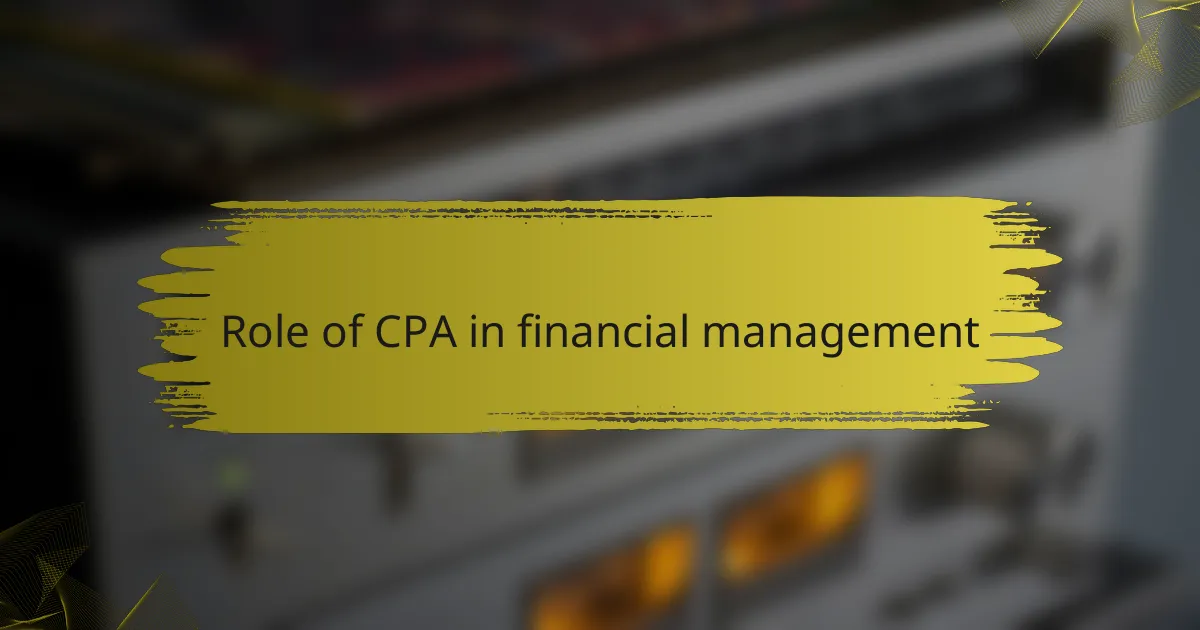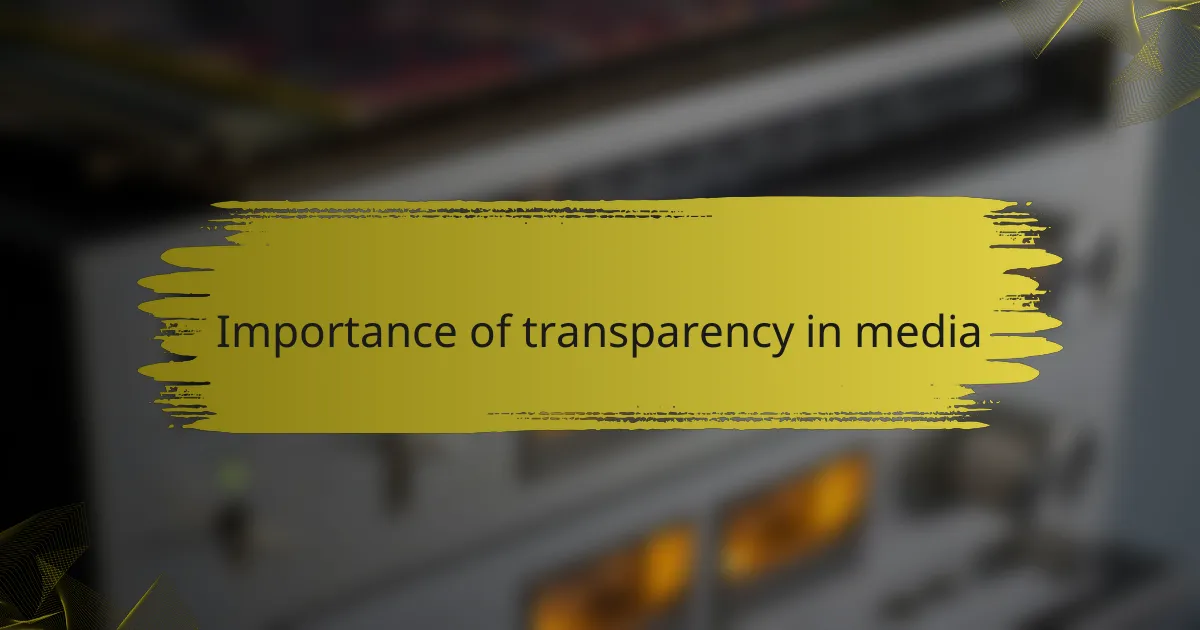Key takeaways
- Understanding financial disclosures requires breaking down complex information into manageable pieces for clearer insight into financial health.
- CPAs play a crucial role in financial management by ensuring compliance and providing valuable insights that can enhance decision-making.
- Transparency in media fosters audience trust and accountability, positively impacting engagement and credibility.
- Effective financial collaborations are built on open communication, clear goals, and regular check-ins to align objectives and celebrate successes.

Understanding financial disclosures
Understanding financial disclosures can often feel overwhelming, right? When I first started diving into this area, I was struck by the complexity of the information disclosed. It’s not just numbers; it’s a narrative about an organization’s financial health, revealing everything from income and expenses to assets and liabilities.
I vividly remember my first experience grappling with my own financial statements. I found myself poring over each line item, trying to decipher what everything meant. It was a bit like trying to read a foreign language without a dictionary. With time and guidance from my CPA, I began to realize that these disclosures offered valuable insights into future opportunities and risks, which changed my perspective.
Have you ever felt lost while trying to understand a report? It’s normal. Financial disclosures are meant to provide transparency, yet they can often act like a puzzle waiting to be solved. With the right approach, I learned that breaking down these documents into manageable pieces made everything click into place. Understanding these disclosures not only empowered me but also gave me a clearer view of my financial decisions.

Role of CPA in financial management
The role of a CPA in financial management cannot be overstated. From my experience, they serve as invaluable guides through the complexities of financial regulations and reporting requirements. They not only ensure compliance but also provide insights that can enhance decision-making and financial planning.
Working with a CPA, I found that having a dedicated professional to interpret financial data made all the difference. Their expertise helped me to identify areas of potential savings and investment opportunities that I might have otherwise overlooked. This partnership transformed my approach to financial management.
Here’s a quick comparison of roles to clarify how CPAs contrast with other financial professionals:
| Role | Key Functions |
|---|---|
| CPA | Compliance, auditing, tax planning, financial consulting |
| Financial Analyst | Data analysis, forecasting, budget planning |
| Bookkeeper | Transaction recording, accounts reconciliation, financial statement preparation |

Importance of transparency in media
Transparency in media is essential, as it builds trust with the audience. From my experience working with a CPA, shedding light on financial disclosures illuminated the importance of accountability. When listeners feel informed, they’re more likely to engage and connect with the content.
In my journey, I’ve seen firsthand how transparency can prevent misinformation and help maintain credibility. For instance, when our station openly shared its funding sources, our audience responded positively, feeling more secure in the integrity of our broadcasts.
Another aspect worth noting is that transparency can inspire other independent media outlets to follow suit. This reinforces a culture of openness, fostering a healthier media environment overall.
| Aspect | Transparent Media | Non-Transparent Media |
|---|---|---|
| Audience Trust | High | Low |
| Credibility | Strong | Weak |
| Engagement | Increased | Decreased |
| Accountability | Ensured | Ignored |

Steps to prepare financial disclosures
Preparing financial disclosures can feel overwhelming, but breaking it down into manageable steps makes a world of difference. I remember when I first started diving into the details; clarity seemed elusive. However, once I organized my approach, I found myself more confident in presenting accurate disclosures.
Here are the steps I took to prepare my financial disclosures:
- Understand the Requirements: Familiarize yourself with the financial disclosure regulations specific to your industry.
- Gather Documentation: Collect all necessary financial documents like bank statements, invoices, and expense reports.
- Organize Financial Data: Group your information logically, ensuring that similar items are categorized together for easy reference.
- Draft Initial Disclosures: Write a rough draft of your disclosures, focused on clarity and accuracy.
- Consult with a CPA: Engaging a CPA can provide invaluable insights and ensure compliance with all accounting standards.
- Review and Revise: Don’t skip this step! Review your disclosures thoroughly, and don’t hesitate to make necessary changes.
- Final Approval: Once everything looks good, get the necessary approvals from stakeholders or partners before submission.
Taking these steps one at a time made the process far less daunting and more structured, leading to a complete, clear, and compliant financial disclosure.

Common challenges in financial disclosures
Navigating financial disclosures can feel daunting, especially in an independent radio media setting where every penny counts. I remember a time I struggled with transparency in our funding sources; it felt like a weight on my shoulders. The fear of misrepresenting our financial health made me anxious, but addressing these challenges head-on was crucial for maintaining trust with our listeners.
One of the biggest hurdles I encountered was the complexity of legal requirements. Each regulation seemed more intricate than the last. Keeping up with these demands while ensuring clarity in our reports was no small feat. Here are some common challenges I’ve observed:
- Lack of clarity on regulatory requirements
- Difficulty in gathering accurate data from various departments
- Fear of unintentionally misleading stakeholders
- Balancing transparency with confidentiality
- Limited resources and expertise to manage disclosures effectively

Personal experience with my CPA
Working closely with my CPA has been an enlightening experience. Initially, I felt overwhelmed by the complexities of financial disclosures, but my CPA took the time to break everything down for me. I remember sitting at my kitchen table with a mountain of receipts, feeling stressed. However, my CPA’s calm demeanor reassured me. They patiently guided me through each document, making the process feel manageable and less intimidating.
Having a CPA by my side truly changed the way I approach my finances. I now view financial disclosures not as a chore but as a proactive step towards securing my financial future. Here’s what I’ve learned through this journey:
- Communication is key; regularly discussing financial matters helps build a strong relationship.
- A good CPA will tailor their advice to fit your unique circumstances.
- Taking the time to understand financial terms can alleviate stress when reviewing disclosures.
- Collaboration can lead to discovering tax-saving opportunities you might never have noticed.
- Trusting my CPA’s expertise allowed me to focus more on my passion for radio media instead of getting lost in the numbers.

Tips for effective financial collaborations
When I first ventured into financial collaborations, I quickly learned the importance of open communication. It’s vital to build a relationship where everyone feels comfortable sharing their financial goals and concerns. In one instance, early on, I made the mistake of assuming my CPA would fully understand my vision without discussing it in depth. That taught me that clarity is essential.
In my experience, having regular check-ins with your financial partners can be a transformative practice. It’s a chance to recalibrate expectations and ensure everyone is aligned with the project’s objectives. Here are some tips I’ve found effective:
- Prioritize transparency; share all relevant financial information upfront.
- Set clear goals and expectations for each collaboration to avoid misunderstandings.
- Schedule regular meetings to discuss progress and adjust plans if necessary.
- Foster a spirit of collaboration by encouraging open dialogue about challenges and successes.
- Celebrate milestones together, as recognizing achievements strengthens the partnership and keeps morale high.
